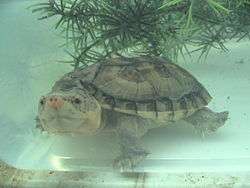Giant musk turtle
| Giant musk turtle | |
|---|---|
 | |
| Scientific classification | |
| Kingdom: | Animalia |
| Phylum: | Chordata |
| Subphylum: | Vertebrata |
| Class: | Reptilia |
| Order: | Testudines |
| Suborder: | Cryptodira |
| Family: | Kinosternidae |
| Subfamily: | Staurotypinae |
| Genus: | Staurotypus |
| Species: | S. salvinii |
| Binomial name | |
| Staurotypus salvinii Gray, 1864 | |
| Synonyms[1] | |
| |
The giant musk turtle (Staurotypus salvinii ) is a species of kinosternid turtle, which is endemic to Central America.
Geographic range
S. salvinii is found in Belize, El Salvador, Guatemala, and Mexico (Chiapas and Oaxaca).
Etymology
The specific name, salvinii, is in honor of English naturalist and herpetologist Osbert Salvin.[2]
Description
S. salvinii are typically much larger than other species of Kinosternidae, attaining sizes of up to 36 cm (14 inches) carapace length, with males being significantly smaller than females. They are typically brown, black, or green in color, with a yellow underside. The carapace is distinguished by three distinct ridges, or keels which run its length.
Diet
Like other musk turtle species, S. salvinii is carnivorous, eating various types of aquatic invertebrates, as well as fish and carrion.
References
- ↑ Fritz, Uwe; Peter Havaš (2007). "Checklist of Chelonians of the World". Vertebrate Zoology. 57 (2): 260–261. ISSN 1864-5755. Archived from the original (PDF) on 2010-12-17. Retrieved 29 May 2012.
- ↑ Beolens, Bo; Watkins, Michael; Grayson, Michael (2011). The Eponym Dictionary of Reptiles. Baltimore: Johns Hopkins University Press. xiii + 296 pp. ISBN 978-1-4214-0135-5. (Staurotypus salvinii, p. 232.)
External links
- Tortoise & Freshwater Turtle Specialist Group (1996). Staurotypus salvinii . 2006 IUCN Red List of Threatened Species. Downloaded on 29 July 2007.
Further reading
- Gray JE (1864). "Description of a New Species of Staurotypus (S. salvinii ) from Guatemala". Proceedings of the Zoological Society of London 1864: 127–128.
